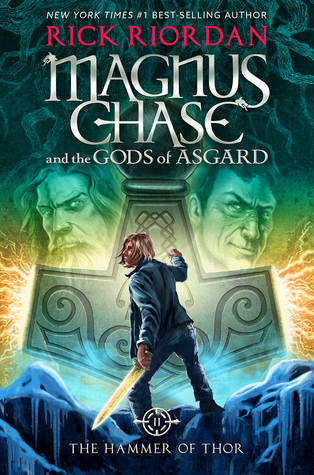Rick Riordan
The Hammer of Thor
Disney Hyperion
480 pages
7.5
Blurb
Thor's hammer is missing again. The thunder god has a disturbing habit of misplacing his weapon--the mightiest force in the Nine Worlds. But this time the hammer isn't just lost, it has fallen into enemy hands. If Magnus Chase and his friends can't retrieve the hammer quickly, the mortal worlds will be defenseless against an onslaught of giants. Ragnarok will begin. The Nine Worlds will burn. Unfortunately, the only person who can broker a deal for the hammer's return is the gods' worst enemy, Loki--and the price he wants is very high.
Review
After writing more than 15 books about Greek, Roman, Egypt and Nordic demigods, Riordan becomes predictable. Part of it is not his fault, especially considering how actually closely those mythologies are related. The main gods may bear different names, but some of their tales share similar quiddity and key-point, and while Riordan who's a little more creative than, let's say, Cassandra Clare (as he writes in different mythology and "world" and researches more), it has become hard for him to freshen the demigods' plot. It's clearly depicted in The Hammer of Thor.
The Hammer of Thor is indeed still blessed with entertainment. The plot, although it's been recycled, still feels exhilarating, the characters still make stupid mistakes as if they had not learned from Percy Jackson and his comrades, and Norse myth, the quirkiest myth of all, is still fascinating. In this second book, Magnus and his friends try to locate the hammer of Thor to save Midgard, the regular human's world, from the infestation of giants. At the same time, they also try to rescind Loki's evil proposal and Loki's ultimate evil plan.
The plot of Riordan's books usually consists of two-three small quests, that are honestly not too necessary, to show some minor characters and fight them to get some key items (Hey, it's rhyme) before finally the heroes get to fight the ultimate battle in the end of the books. The Hammer of Thor is no different, as our characters move from world to world just to get some items. When you think about it, you will begin to realize that all of this journey is useless if the experienced characters, e.g. Sam, just say what's necessary so that their journey becomes more effective.
Albeit unoriginal, Riordan, however, manages to tackle the diversity issues as he introduces one gender-fluid characters and tries to unveil the Muslim background of Sam, the valkyrie and the duality of her life that seems paradoxical. In The Hammer of Thor, Riordan explains what actually gender-fluid really means in the way that's briefer than Garvin's The Symptoms of Being Human, but adequate, to expand the mind of his readers. He also unveils the religious side of Sam, describing how Muslim prayers work from the eyes of Magnus, and boldly states that both religion and mythology can live harmoniously. It itself can be considered blasphemous in this country, but surely Riordan just means to open his readers' eyes that there are different cultures, religions, races, sexualities out there, that the world isn't a homogeneous place, but it's vastly heterogeneous. It's the important message that Riordan tries to convey here.
The Hammer of Thor is indeed still blessed with entertainment. The plot, although it's been recycled, still feels exhilarating, the characters still make stupid mistakes as if they had not learned from Percy Jackson and his comrades, and Norse myth, the quirkiest myth of all, is still fascinating. In this second book, Magnus and his friends try to locate the hammer of Thor to save Midgard, the regular human's world, from the infestation of giants. At the same time, they also try to rescind Loki's evil proposal and Loki's ultimate evil plan.
The plot of Riordan's books usually consists of two-three small quests, that are honestly not too necessary, to show some minor characters and fight them to get some key items (Hey, it's rhyme) before finally the heroes get to fight the ultimate battle in the end of the books. The Hammer of Thor is no different, as our characters move from world to world just to get some items. When you think about it, you will begin to realize that all of this journey is useless if the experienced characters, e.g. Sam, just say what's necessary so that their journey becomes more effective.
Albeit unoriginal, Riordan, however, manages to tackle the diversity issues as he introduces one gender-fluid characters and tries to unveil the Muslim background of Sam, the valkyrie and the duality of her life that seems paradoxical. In The Hammer of Thor, Riordan explains what actually gender-fluid really means in the way that's briefer than Garvin's The Symptoms of Being Human, but adequate, to expand the mind of his readers. He also unveils the religious side of Sam, describing how Muslim prayers work from the eyes of Magnus, and boldly states that both religion and mythology can live harmoniously. It itself can be considered blasphemous in this country, but surely Riordan just means to open his readers' eyes that there are different cultures, religions, races, sexualities out there, that the world isn't a homogeneous place, but it's vastly heterogeneous. It's the important message that Riordan tries to convey here.

EmoticonEmoticon